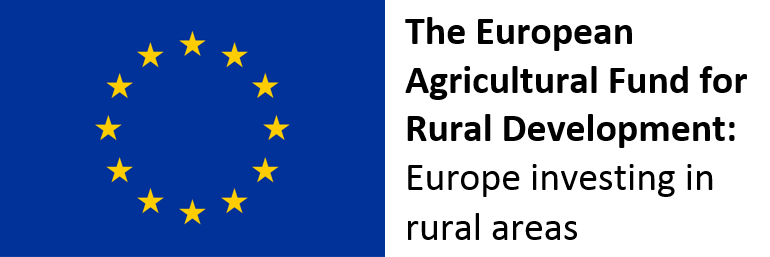Objectives and goals of the funding programme
The European agricultural fund for rural development (EAFRD) finances the CAP’s contribution to sustainable development of rural areas through three long-term objectives:
- Fostering the competitiveness of agriculture and forestry;
- Ensuring the sustainable management of natural resources and climate action;
- Achieving a balanced territorial development of rural economies and communities.
The EU supports action to meet six priority objectives:
- Fostering knowledge transfer and innovation;
- Enhancing viability and competitiveness of all types of agriculture and the sustainable management of forests;
- Promoting food chain organisation, including processing and marketing of agricultural products, animal welfare and risk management;
- Restoring, preserving and enhancing ecosystems related to agriculture and forestry;
- Promoting resource efficiency and the transition to a low-carbon economy;
- Promoting social inclusion, poverty reduction and economic development in rural areas.
EU Member States and regions may also address issues of particular importance in their area such as:
- Young farmers;
- Small farms;
- Mountain areas;
- Women in rural areas;
- Climate change mitigation, adaptation and biodiversity.
Type of Programme
European Agricultural Fund for Rural Development
Funding type/type of support
Financing (Loans/Guarantees)
Organizational level
International
Programme Focus
Sustainable tourism, Smart / digital tourism, Skills, Competitiveness, research and innovation
Programme relevant for/ target group
SMEs and micro companies, VET Providers, Other
Geographic area
European Union
The EAFRD budget for 2021-27 amounts to €95.5 billion, which includes an injection of €8.1 billion from the next generation EU recovery instrument. The budget for 2014-20 amounts to around €100 billion.
The maximum amount of support must not exceed €7,000 per farmer and €50,000 per SME.
The intended audience comprises Small and Medium Enterprises (SMEs), Large Enterprises, Government bodies, Municipalities, Communities & NGOs, and Knowledge Centers.
This funding provides for:
• Administrative and technical support activities required to implement the CAP, including surveys and monitoring, audit and inspection measures, and the maintenance of agricultural accounting IT systems;
• Promotion activities for EU agricultural products by international organisations, executive agencies, and the Commission itself.
EU countries had the possibility to include tourism-related investments in their CAP Strategic Plans, which are being implemented from January 2023 onwards. Such support could, for instance, include initiatives for territorial economic development and rural infrastructure, the renewal of villages and/or actions to:
- Conserve small-scale built heritage (e.g. chapels, bridges, public amenities);
- Build and renovate tourist offices;
- Update visitor information;
- Other leisure, recreational and/or sports activities.
Many rural areas in the European Union suffer from structural problems such as a lack of attractive employment opportunities, skill shortages, under-investment in connectivity, infrastructure and essential services, as well as youth brain drain. It is fundamental to strengthen the socio-economic fabric in these areas, particularly through creating jobs and generational renewal.
Bringing jobs and growth to rural areas will promote social inclusion, and help develop smart villages across the European countryside. New rural value chains such as renewable energy, the emerging bioeconomy, the circular economy, and various types of tourism activities can offer good growth and job creation for rural areas.
- Project Title:Diversifying a farm’s income by investing in agrotourism (Arcevia, Italy)
To diversify a farm’s income, Rural Development Programme support was used to renovate a 19th century house to offer accommodation in six apartments, with 24 beds. The entrepreneur envisaged hosting tourists for at least 4 months a year to provide him with a significant income flow. This will compensate for years when olive production is low.
EU contribution: €80,736.30
- Project Title: Chevetogne – combining a wetland ecosystem observation area with social tourism
This project for Chevetogne campsite involved rehabilitating and landscaping part of an old caravan park bordering the ponds. This area stretching over three hectares was restored into a wetland and accompanying nature observation area, along with a biodiversity lab. The restored area will accommodate some picnic facilities and two play areas for children. An additional development will extend the walking trail for people with reduced mobility.
EU contribution: €387,000
- Project Title: Historical and Folklore Museum of Nikiti
Nikiti is a village in Chalkidiki, Greece. Its economy is based on agriculture and tourism. The area is full of hotels and tourist accommodation, but was lacking in cultural facilities such as museums and exhibition centres. In order to fill this gap and create tourist attractions, an old school building was transformed into a folklore museum. The grant helped to finance the renovation and also created jobs for the local community.
Total budget: €206,545
